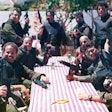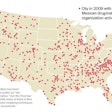Recently, I had the privilege of sharing the stage at a dinner for the Arizona Immigration Reform Council with Mike Ligon. Mike is the author of a "must read" expose called, "10 Years On the Line: My War On the Border."
Mike is an Oklahoma native and a former Marine. He's fluent in Spanish, which he picked up as an enlisted weapons and communication specialist with Fifth Special Forces, and later as a detachment commander in the Seventh Special Forces Group (ABN). He earned a bachelor's in Criminal Justice from Brigham Young University and a master's from Webster University.
Mike's specialized training is in military intelligence and counterinsurgency. He teaches these subjects at the U.S. Army Intelligence Center and School at Fort Huachuca, Ariz. His background has led to carefully preserved facts that have been well documented from hundreds of incident reports, memorandums, and investigative records.
"10 Years On the Line" is the factual account of Mike's 10 years as an immigration, customs and border officer. It illuminates and places a critical magnifying glass over the checkpoint at Douglas, Arizona—this nation's most corrupt point of entry.
The book exposes line officers' daily struggle with government managers trying to do his job—preventing illegal aliens and criminals from unlawfully entering the United States. This sector is the most law-enforcement saturated along the border, and the book documents in detail a systematic, institutionalized culture of corruption, malfeasance and disloyalty. I believe this malfeasance has crept into other sectors as well. The book covers a period in which these policies were instituted at the direction of federal administrators from both Republican and Democratic parties.
The book begins with a quote from Samuel Adams, "If ever a time should come when vain and aspiring men shall possess the highest seats in government, our government shall stand in need of its experienced patriots to prevent its ruin."
Mike writes about the gang members he identified and documented who crossed into the U.S. at the Douglas checkpoint. Many of these gang members weren't from the area. They arrived from all over Mexico to cross at Douglas because of their involvement in drug and human trafficking. Many were from the big transnational gangs who came from Los Angeles such as Florence 13 (F-13), 18th Street (XV3 or 666) and Mara Salvatrucha (MS-13). Some were from Outlaw Motorcycle Gangs. His bosses ordered him not to share this information with state and local police.
After hearing Mike describe the situation, I was left with the thought—no wonder the border is so screwed up, because the rule of law and the will of the American people have been betrayed by those appointed to secure it.
After our talks, Mike and I took a few questions from the audience. During one of the responses he pointed out that the immigration problem wasn't just another issue, it was the issue. If you care about jobs and the economy, the environment, health care, criminal gangs and organized crime, drug abuse, human slavery, public corruption, the rule of law, and the security of the United States, you'd better make immigration a priority.
As proponents of open borders often point out, we're a nation of immigrants. When these immigrants faced discrimination from the majority culture, each new arriving minority group spawned its own version of criminal gangs. The Irish gangs, Jewish gangs, Italian gangs, Latinos, Asians, Russians, Africans and Middle-Eastern gangs have all found turf in our land of plenty. As these cultures assimilated into mainstream America, the problem of these ethnic and cultural criminal gangs shrank. If the immigrating groups resisted assimilation, as some did, the problem of criminal gangs rooted and spread within the immigrant population.
If we continue to allow the unchecked illegal immigration of millions into conclaves of foreign cultures into our already overtaxed urban infrastructure, we're creating an incubator for the breeding of criminal street gangs. When these unassimilated masses become significant in numbers, they often create civil unrest and rioting. We've already witnessed this result in European cities such as London and Paris.
During my part of the talk I asked, what would happen if each of the attendees returned home that night to find three or four uninvited strangers eating their food and watching their TV? To take it further, what if these strangers organized and protested against the homeowners by demanding that their rights be respected and they be allowed to stay?
The Judeo-Christian culture places high value on hospitality, but it still requires that a guest knock to request entry. Permission to enter must be granted by the resident and his household. Some religious-minded people argue for sanctuary and point out that Jesus was himself once an immigrant in Egypt. Yes, but not an illegal immigrant.
Are border agents taking bribes for entry? The "mordida" (bite) is a term used in Mexico to describe the culturally accepted and universally common custom of bribery and corruption in government. This system of thwarting the rule of law and the will of the people for money or position has crossed the border and established itself in this country. There are an embarrassing number of local, state, and federal officers who have been caught taking the mordida on our side of this border.
One must wonder how much this mordida is affecting our elected officials who make and enforce our screwed up immigration policy. If you feel the same, take one more quote from my friend Mike Ligon, "Speak up!"
















